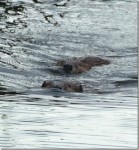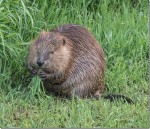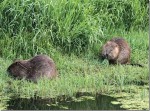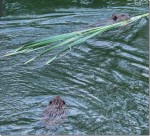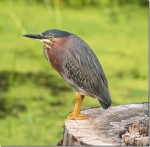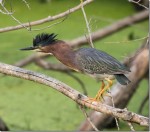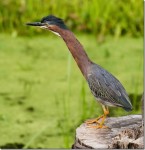That someone created a social media handle for “Downtown Deer”, who was known to roam through the park and adjacent West End streets, shows just how rare it is for a large animal to make its home within the city limits.
And yet the city has recently become a haven for a variety of wildlife that have reestablished in the most urban parts of Metro Vancouver, from the ubiquitous coyotes, raccoons and skunks in every neighbourhood, to small but thriving populations of beavers in several city parks.
“We have this affinity for nature. We really do. Whether it is a whale in English Bay or beavers in Olympic Village, there is something very captivating about wildlife in the city,” said Nick Page, the resident biologist for the Vancouver Park Board.

Could it be that what we LOVE about wildlife in the city is the HUMANITY with which it tinges those many anonymous faces with which we are forced to share our sidewalks and hallways? How many people did I talk to about the beavers that I never would have spoken to without them? Even in the days before Worth A Dam. How many places would I have stopped and chatted with strangers on the street if it wasn’t to ask if there’s a beaver on their side of the bridge yet?
Earlier in February, the park board unveiled a new “biodiversity strategy”, aimed at restoring or enhancing 25 hectares of natural areas in the city over the next four years. Concerned about continuing threats to the city’s natural environment — from habitat loss to climate change to environmental contamination to invasive species — the city is trying to create more natural spaces in which animals can thrive.
A broad range of animals once found in Vancouver are now listed as “extirpated” or locally extinct: deer, elk, bears, chipmunks, red-legged frogs, the spotted skunk, cougars, martens, grey wolves, red fox, bobcats, the short-tailed weasel. The park board says the populations of many species of native birds, insects, frogs, fish, plants and small mammals are in decline. It lists at least 20 species at risk, including the western painted turtle, Johnson’s hairstreak butterfly, the Vancouver Island beggartricks, a wetland sunflower, and the western bumble bee.
Hinge Park itself has become an unusual gathering spot for urban wildlife. Created just seven years ago at the western edge of Olympic Village, the narrow park encompasses a creek that empties out in front of man-made Habitat Island. The small park has become home to a pair of beavers, coyotes, river otters, raccoons and waterfowl.
“How cool is it that you can say you live in Olympic Village and have beavers in your backyard,” Page said. “I think in the last few years we’ve seen more diverse wildlife move back into the city.
I like having beavers in my city, but I’d REALLY like having biologists like Nick Page working here. Good lord, they are lucky to have him. And I’d like to think he’s read this website a time or two. It’s striking to remember how many conversations I’ve had with strangers that were about wildlife. If it wasn’t one of us asking for directions, it was one of us asking what bird that was or if those were beavers.
As a young tween my parents toted me to on a trip to Italy once they had fantasized about and saved for for years. I, of course being barely 13 was busy fantasizing about Shaun Cassidy or Star Wars, but amused myself while they fawned over masterpeices by feeding pigeons. Without any respect for the enormity of where I was I would tuck the role from breakfast into my purse at whatever historic hotel we were staying in at the moment, and stroll into the squares or gardens while they listened to tour guides and amuse myself by feeding pigeons.
One time, a little Italian child joined me and we had a great time encouraging them to come closer and closer in St. Marks Square. After the pigeon-enticing bread was gone she turned to me in all seriousness and spoke the urgent words, “Que lingua parla?”. When I stared at her without understanding she repeated them again more slowly, until I had enough bad spanish and foreign movies to guess that she was asking “what language do you speak?” When I answered ‘English’ her five year old face hardened with concentration as she reached around in her mind for any phrases she might have learned.
“Thank you.” She finally said, proudly, and ran back to the elder gentleman waiting for her in the plaza, I always imagined it was her grandpa.
On our trip to Italy I saw the statue of David, the Coliseum, and the Sistine chapel. But what I remember is feeding pigeons with a little girl who bravely broke the culture barrier.
Nature in the city, indeed.


